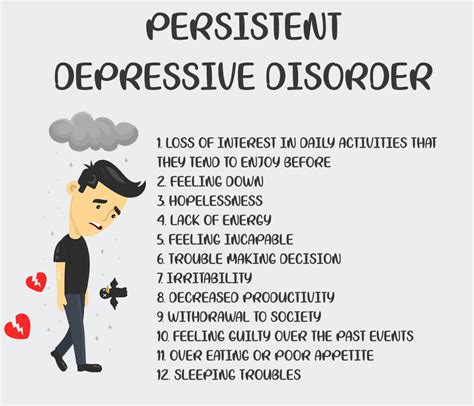Severe Depressive

Severe depressive episodes, often referred to as major depressive episodes, are a critical aspect of mental health that demands attention and understanding. These episodes can significantly impact an individual's daily life, affecting their emotions, thoughts, and overall functioning. In this comprehensive guide, we will delve into the depths of severe depressive episodes, exploring their symptoms, causes, and the various treatment options available. By shedding light on this topic, we aim to provide valuable insights and resources for those affected by severe depression and their support systems.
Understanding Severe Depressive Episodes

Severe depressive episodes are characterized by a persistent and intense feeling of sadness, hopelessness, and a loss of interest in activities that were once enjoyable. These episodes go beyond the occasional feelings of sadness or temporary mood swings; they are prolonged and debilitating, often interfering with an individual’s ability to carry out everyday tasks and maintain relationships.
According to the Diagnostic and Statistical Manual of Mental Disorders (DSM-5), a severe depressive episode is diagnosed when an individual experiences a combination of symptoms, including depressed mood, loss of pleasure in activities, significant weight changes, insomnia or hypersomnia, psychomotor agitation or retardation, fatigue, feelings of worthlessness or guilt, diminished ability to think or concentrate, and recurrent thoughts of death or suicide. These symptoms must be present for at least two weeks and cause significant distress or impairment in social, occupational, or other important areas of functioning.
Symptoms and Impact
The symptoms of severe depression can vary from person to person, but some common experiences include:
- Persistent feelings of sadness, emptiness, or despair.
- Loss of interest or pleasure in activities once enjoyed, including hobbies, social interactions, and even favorite foods.
- Changes in appetite, leading to significant weight loss or gain.
- Sleep disturbances, such as insomnia or excessive sleeping.
- Fatigue and lack of energy, making even simple tasks exhausting.
- Feelings of worthlessness, guilt, or self-blame.
- Difficulty concentrating, making decisions, or remembering things.
- Recurrent thoughts of death or suicide, with or without specific plans.
- Physical symptoms such as headaches, digestive issues, and chronic pain.
The impact of severe depression extends beyond the individual. It can strain relationships, affect work or academic performance, and lead to social isolation. The intense emotional pain and despair associated with severe depression can make it challenging for individuals to seek help, adding to the complexity of this mental health condition.
| Symptom | Description |
|---|---|
| Depressed Mood | Persistent feelings of sadness, hopelessness, or emptiness. |
| Anhedonia | Loss of interest or pleasure in most activities. |
| Sleep Disturbances | Insomnia, early-morning awakening, or excessive sleeping. |
| Appetite Changes | Significant weight loss or gain unrelated to dieting. |
| Psychomotor Agitation/Retardation | Restlessness or slowed movements and speech. |
| Fatigue | Persistent lack of energy and increased fatigue. |
| Feelings of Worthlessness | Excessive guilt or self-blame. |
| Cognitive Impairment | Difficulties in concentration, decision-making, and memory. |

Causes and Risk Factors

The development of severe depressive episodes is a complex interplay of genetic, biological, environmental, and psychological factors. While the exact cause is not fully understood, researchers have identified several key contributors to the onset of depression.
Biological Factors
Biological factors play a significant role in the development of severe depression. Imbalances in certain neurotransmitters, such as serotonin, norepinephrine, and dopamine, are believed to contribute to depressive symptoms. Additionally, changes in brain structure and function, particularly in areas associated with mood regulation, have been observed in individuals with depression.
Genetic predisposition is another biological factor. Studies suggest that individuals with a family history of depression may be more susceptible to developing severe depressive episodes. However, it's important to note that genetics alone do not determine the onset of depression; environmental and psychological factors also play crucial roles.
Environmental and Psychological Factors
Environmental and psychological factors can trigger or exacerbate depressive symptoms. Stressful life events, such as the loss of a loved one, relationship issues, financial problems, or chronic illness, can act as catalysts for depression. Moreover, ongoing exposure to stressful or traumatic situations, such as abuse, neglect, or persistent adversity, can increase the risk of developing severe depressive episodes.
Psychological factors, including cognitive distortions and negative thought patterns, also contribute to depression. Individuals with severe depression often experience distorted thinking, such as magnifying negative aspects of their lives or catastrophizing minor setbacks. These negative thought patterns can create a cycle of despair and hopelessness.
Risk Factors
Certain risk factors can increase an individual’s susceptibility to severe depressive episodes. These include:
- Personal or family history of depression or other mental health disorders.
- Significant life changes or stressors, such as the death of a loved one or a major illness.
- Chronic physical health conditions, such as heart disease or diabetes.
- Substance abuse or dependence.
- Lack of social support or isolation.
- Traumatic experiences, including physical or emotional abuse.
- Certain personality traits, such as perfectionism or low self-esteem.
It's important to note that having one or more risk factors does not necessarily mean an individual will develop severe depression. However, being aware of these factors can help individuals and their support systems take proactive measures to prevent or manage depressive episodes.
Treatment and Management
Severe depressive episodes can be effectively treated and managed through a combination of therapeutic interventions, medication, and lifestyle modifications. The treatment approach is often tailored to the individual’s specific needs and circumstances.
Psychotherapy
Psychotherapy, also known as talk therapy, is a cornerstone of depression treatment. Various therapeutic approaches have proven effective in helping individuals manage their symptoms and improve their overall well-being. Some commonly used therapies for depression include:
- Cognitive Behavioral Therapy (CBT): CBT focuses on identifying and changing negative thought patterns and behaviors associated with depression. It helps individuals develop coping strategies and challenge distorted thinking.
- Interpersonal Therapy (IPT): IPT aims to improve interpersonal relationships and social skills, as relationship issues are often a trigger or consequence of depression. It helps individuals understand and address the impact of their relationships on their mood.
- Psychodynamic Therapy: This therapy explores the underlying psychological conflicts and unresolved issues that may contribute to depressive symptoms. It helps individuals gain insight into their emotions and behaviors.
- Mindfulness-Based Therapies: Therapies like mindfulness-based cognitive therapy (MBCT) and dialectical behavior therapy (DBT) teach individuals to be more present and aware of their thoughts and emotions without judgment. These approaches can be particularly beneficial for managing depressive symptoms and preventing relapse.
The choice of therapy often depends on the individual's preferences, the severity of their symptoms, and the therapist's expertise. Combining different therapeutic approaches can also be beneficial, as each individual's experience of depression is unique.
Medication
Antidepressant medications are commonly prescribed to manage severe depressive episodes. These medications work by altering the levels of certain neurotransmitters in the brain, helping to regulate mood and alleviate symptoms. Common types of antidepressants include selective serotonin reuptake inhibitors (SSRIs), serotonin-norepinephrine reuptake inhibitors (SNRIs), tricyclic antidepressants (TCAs), and monoamine oxidase inhibitors (MAOIs).
It's important to note that finding the right medication and dosage can be a process of trial and error. Individuals may need to work closely with their healthcare provider to find the most effective and well-tolerated medication. Additionally, antidepressants often take several weeks to reach their full effect, and it's crucial to continue taking them as prescribed, even if symptoms improve.
Lifestyle Modifications
Making certain lifestyle changes can significantly contribute to the management of severe depression. These modifications include:
- Regular Exercise: Engaging in regular physical activity, such as walking, jogging, or yoga, can boost mood and reduce symptoms of depression. Exercise releases endorphins, which are natural mood lifters, and it can also provide a sense of accomplishment and improve overall well-being.
- Healthy Diet: A balanced diet rich in nutrients, including fruits, vegetables, whole grains, and lean proteins, can support brain health and overall mood. Certain foods, such as omega-3 fatty acids found in fish and nuts, have been linked to improved mood and cognitive function.
- Sleep Hygiene: Establishing a consistent sleep schedule and creating a relaxing bedtime routine can improve sleep quality. Adequate sleep is crucial for managing depression, as it helps regulate mood and energy levels.
- Stress Management: Learning effective stress management techniques, such as deep breathing, meditation, or mindfulness practices, can help individuals cope with the challenges of depression. Managing stress can prevent the exacerbation of depressive symptoms.
- Social Support: Maintaining a strong support network of friends, family, or support groups can provide a sense of belonging and reduce feelings of isolation. Social support is essential for managing depression and promoting overall mental well-being.
It's important to remember that severe depressive episodes are treatable, and with the right combination of therapeutic interventions, medication, and lifestyle modifications, individuals can experience significant improvements in their symptoms and overall quality of life.
Long-Term Management and Prevention
Managing severe depressive episodes is an ongoing process that requires consistent effort and support. While treatment can significantly alleviate symptoms, it’s crucial to adopt a long-term perspective to prevent relapse and maintain overall well-being.
Continuing Therapy and Medication
For individuals who have experienced severe depressive episodes, continuing therapy and medication, even after symptoms improve, is often recommended. This proactive approach can help prevent relapse and provide ongoing support for managing depression.
Therapy can help individuals develop long-term coping strategies and address any underlying issues that may contribute to depression. It provides a safe space to process emotions, work through challenges, and build resilience. Additionally, regular therapy sessions can help individuals recognize early warning signs of depression and implement preventive measures.
Continuing medication, under the guidance of a healthcare provider, can also be an important part of long-term management. Antidepressants can help stabilize mood and prevent depressive episodes from recurring. It's crucial to follow the prescribed dosage and duration, even if symptoms seem to be well-controlled, to ensure the medication's effectiveness.
Lifestyle and Self-Care
Lifestyle modifications and self-care practices play a crucial role in long-term depression management. Adopting healthy habits and making self-care a priority can help individuals maintain their mental well-being and prevent depressive symptoms from returning.
- Exercise and Physical Activity: Maintaining a regular exercise routine can be a powerful tool for managing depression. Exercise releases endorphins, reduces stress, and improves overall mood. Whether it's a daily walk, yoga, or a fitness class, finding an enjoyable physical activity can be a valuable part of self-care.
- Nutrition and Diet: A healthy diet can support brain health and overall well-being. Including a variety of nutrient-rich foods, such as fruits, vegetables, whole grains, and lean proteins, can provide the body and mind with the fuel they need. Additionally, staying hydrated and limiting processed foods and excessive sugar intake can contribute to better mood and energy levels.
- Sleep Hygiene: Establishing a consistent sleep routine and creating a relaxing bedtime environment can improve sleep quality. Adequate sleep is essential for managing depression and maintaining overall health. Avoiding screens before bed, practicing relaxation techniques, and maintaining a cool, dark bedroom can promote better sleep.
- Stress Management: Learning effective stress management techniques is vital for long-term depression management. Deep breathing exercises, meditation, mindfulness practices, and engaging in hobbies or activities that bring joy can help individuals cope with stress and prevent depressive symptoms from resurfacing.
- Social Connections: Maintaining strong social connections and fostering a supportive network of friends and family can provide a sense of belonging and reduce feelings of isolation. Social support is a powerful tool for managing depression and promoting overall well-being.
By adopting these lifestyle modifications and prioritizing self-care, individuals can take an active role in their long-term depression management. It's important to remember that self-care is not a one-time event but a continuous practice that requires dedication and commitment.
Conclusion: A Path Towards Recovery

Severe depressive episodes can be challenging, but with the right support, treatment, and self-care, individuals can find their way towards recovery and improved well-being. Understanding the symptoms, causes, and treatment options is a crucial step in managing depression effectively.
By seeking professional help, engaging in therapy, and exploring medication options, individuals can begin to alleviate their symptoms and regain control over their lives. Additionally, making positive lifestyle changes and adopting self-care practices can further enhance their journey towards recovery.
Remember, severe depression is a treatable condition, and with persistence, patience, and the right resources, individuals can achieve significant improvements in their mental health. It's essential to reach out for support, stay connected with loved ones, and continue to prioritize self-care on the path towards a brighter and more hopeful future.
FAQ
What are some common triggers for severe depressive episodes?
+
Common triggers for severe depressive episodes can include stressful life events such as the loss of a loved one, relationship issues, financial problems, or chronic illness. Ongoing exposure to stress, trauma, or adversity can also increase the risk. Additionally, certain personality traits like perfectionism or low self-esteem may make individuals more susceptible to depression.
How long does it typically take for antidepressant medication to start working?
+
Antidepressant medication typically takes several weeks to reach its full effect. It’s important to continue taking the medication as prescribed, even if symptoms seem to improve, as the full benefits may not be felt immediately. The exact timeframe can vary depending on the individual and the specific medication.
Are there any natural remedies or supplements that can help manage severe depression?
+
While natural remedies and supplements may provide some support, they should not replace professional treatment. Some natural options, such as St. John’s Wort or omega-3 fatty acids, have shown potential in managing depression symptoms. However, it’s essential to consult with a healthcare provider before taking any supplements to ensure safety and effectiveness.
Can severe depression lead to other mental health issues?
+
Yes, severe depression can increase the risk of developing other mental health issues. Prolonged depression can contribute to the development of anxiety disorders, substance abuse, or even psychotic symptoms. It’s important to seek professional help to address depression and prevent the onset of other mental health conditions.
What is the role of support groups in managing severe depression?
+
Support groups provide a safe and supportive environment for individuals with severe depression to share their experiences, gain insights, and receive emotional support.


